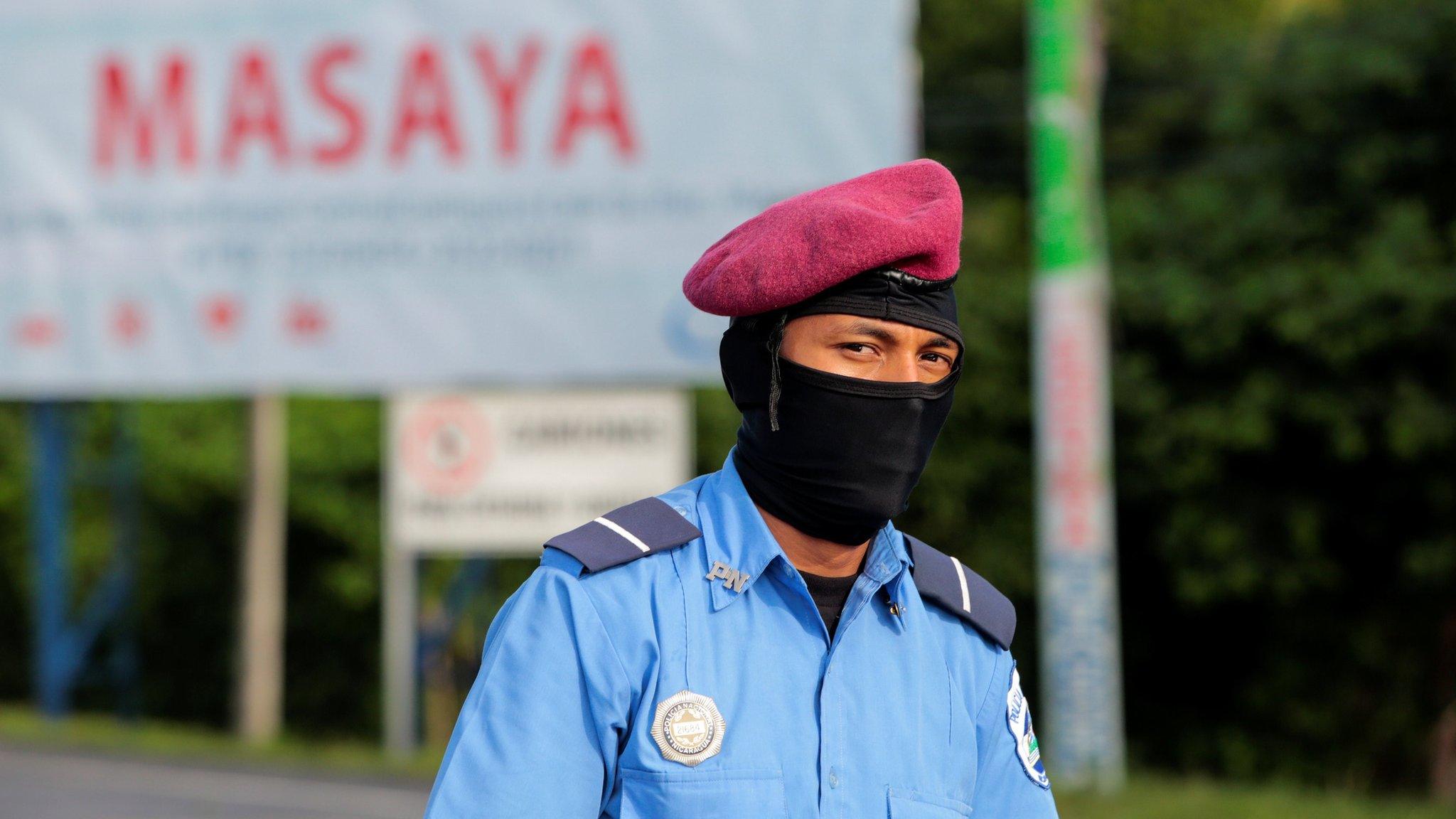Nicaragua's Daniel Ortega rejects demands to step down
- Published
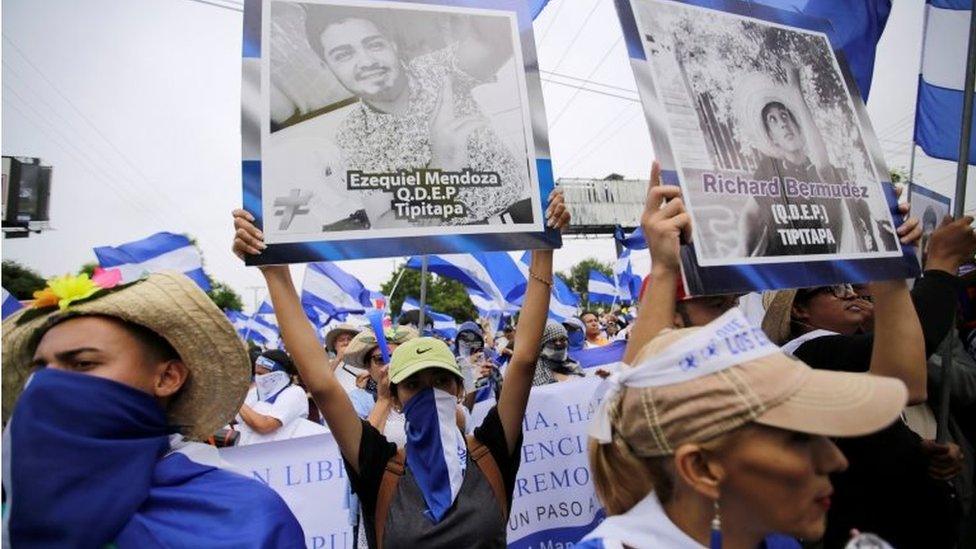
Anti-government protesters are demanding justice for those killed in demonstrations
Nicaragua's President Daniel Ortega has refused to bow to protesters' demands that he stand down.
He said the deaths of about 300 people during three months of protests were caused by paramilitary groups, during an interview with US news channel Fox.
He said the groups behind the violence were funded by opposition MPs and drug cartels but provided no evidence of the alleged links.
Human rights groups say armed groups loyal to the state are responsible.
What did President Ortega say?
Speaking following scathing international criticism of his government's actions during the anti-government protests, President Ortega went on the offensive, blaming the opposition for the turmoil his country has been experiencing.
He also ruled out holding early elections, the main compromise mediators had suggested at talks between the two sides. Below we take a closer look at what he told Fox News and how it compares to what others both inside and outside Nicaragua are saying.
On the anti-government protests:
President Ortega said: "It's been a week now that turmoil has stopped. Matters are becoming more normal in the country and there have been some demonstrations both against and in favour of the government."
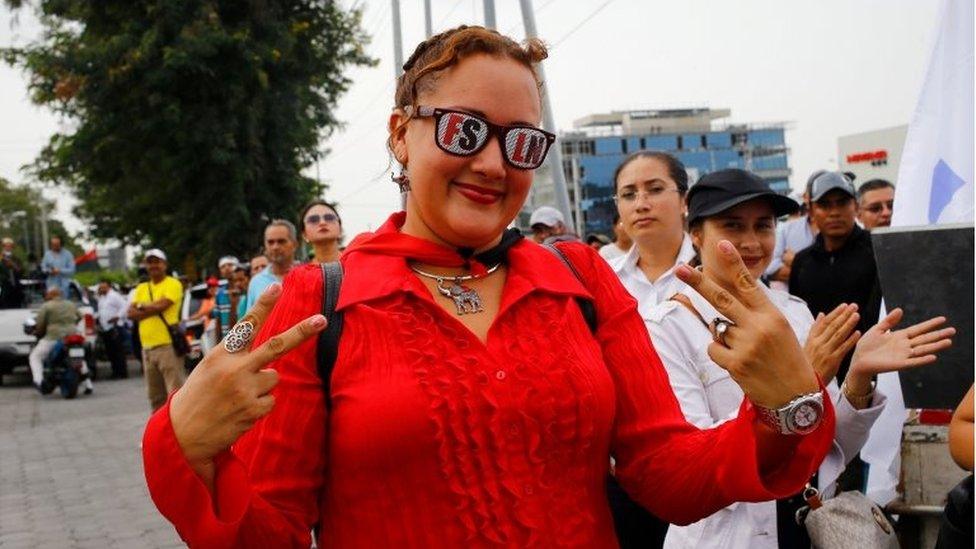
Monday saw demonstrators in favour of the governing FSLN party take to the streets
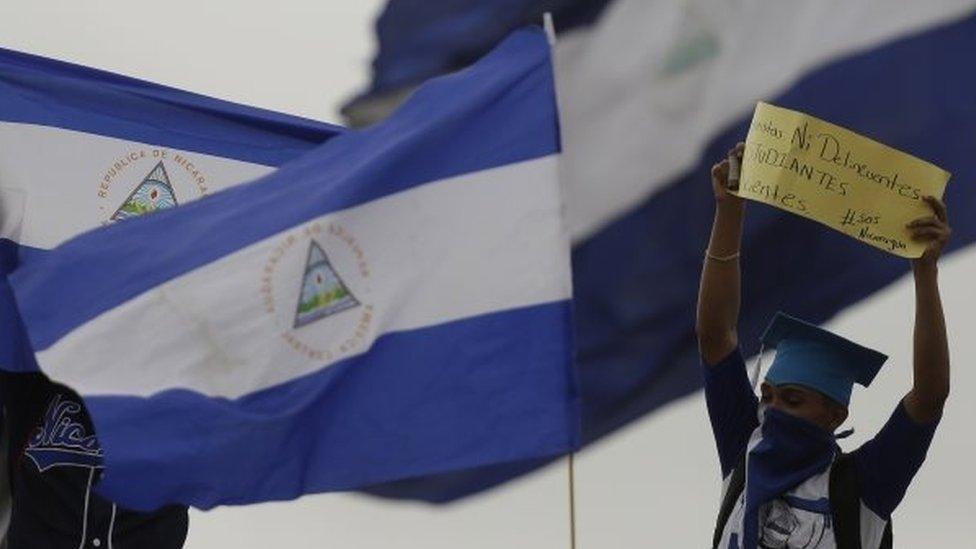
But students also came out in force wearing mortar boards and holding up denying they are "delinquents"
On Monday there were rival demonstrations by both supporters and opponents of President Ortega.
Thousands of students waving flags of the governing Sandinista party gathered in the capital, Managua, to show their continued backing for the president, and accused anti-government groups of being "terrorists".
Thousands of anti-government students also gathered in the capital and other cities holding up notebooks and pens shouting they were "not terrorists but students".
While no deaths were reported at the marches and recent days have seen fewer clashes, it is not clear whether the turmoil has stopped for good.
Some protest leaders in opposition hotspots such as the city of Masaya told local media that they were going into hiding after their friends were "kidnapped" by the security forces.
The Nicaraguan Centre for Human Rights (Cenidh) said on Monday that between 400 and 500 protesters were being held in detention across the country.
On who is behind the violence:
President Ortega said: "There were armed attacks by paramilitary groups against organisations of the state, against the police, against loyal Sandinista families, and then they [the protesters] started blocking the entire country.
"These are groups that obey political organisations, some are members of the Liberal Party... and they've been organising these paramilitary groups for some time now, and they have taken advantage of every small situation to launch attacks."
The presence of paramilitary groups in Nicaragua is not disputed. Protesters have denounced their violent actions from the very first day demonstrations started on 18 April.
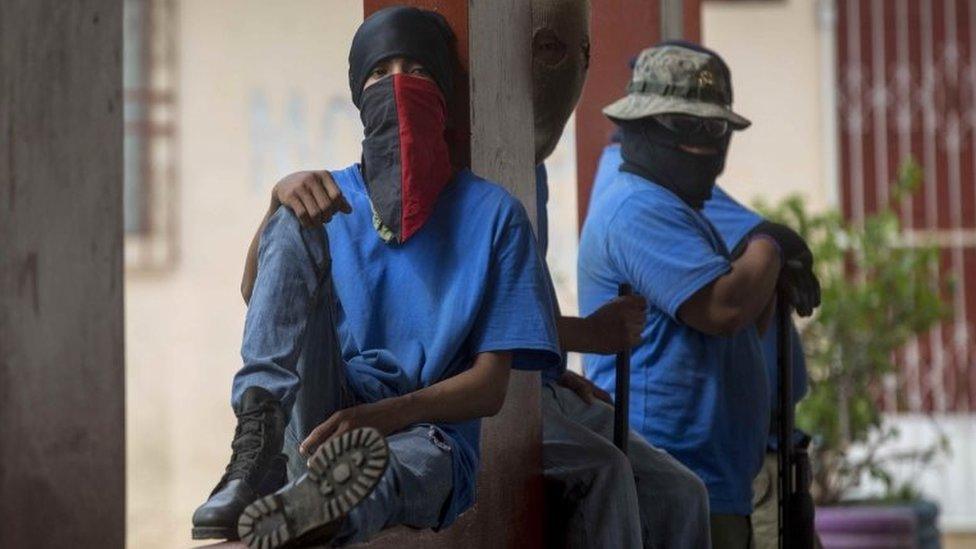
A paramilitary wearing a bandanna in the colours of the governing party sits on a wall in Masaya
However, where President Ortega diverges completely from what international and local human rights groups are saying is who the members of these groups are and whom they are targeting.
"A wide range of human rights violations are being committed including extrajudicial killings, torture, arbitrary detentions, and denying people the right to freedom of expression," a spokesman for the United Nations Office on Human Rights said on 16 July.
"The great majority of violations are by government or armed elements who seem to be working in tandem with them," the spokesman, Rupert Colville, said.
The head of the Inter-American Commission on Human Rights, Paulo Abrao, told Agence France Press news agency on 18 July that "the proportions of those killed (20 police among the 285 dead) and injured (more than 1,800) clearly demonstrate that there has been a combined police and paramilitary operation against those opposing the government".
On the repression of demonstrations:
President Ortega said: "None of the peaceful demonstrations have been attacked. The clashes happened at night when there were no peaceful demonstrations.
"We've had clashes provoked by paramilitary forces organised by people against the government and who've attacked police stations.
"No Nicaraguan has died in any church. Not a single Nicaraguan has died in any church, that's false."
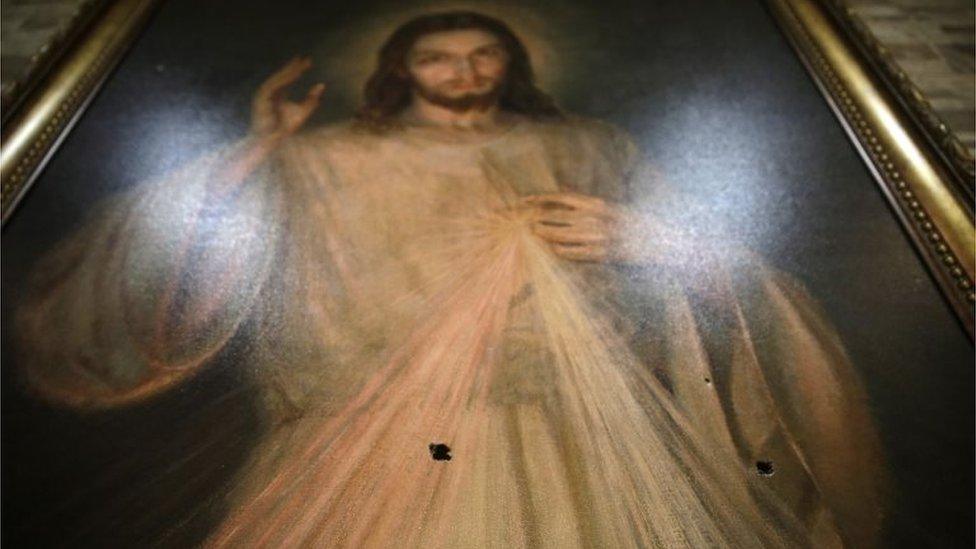
The church of Divine Mercy in Managua came under siege on 13 July, and bullet holes can be seen in paintings inside
Reports of violent clashes between police and pro-government paramilitary groups on the one hand and anti-government protesters on the other have been widespread, and pictures taken by photographers working for international news agencies suggest these happened in daylight as well as during the night.
A report released on 29 May by Amnesty International was highly critical of the security forces, external. It documented "the Nicaraguan police's use of lethal weapons, the large numbers of people injured by firearms, the trajectory of shots fired, the concentration of bullet wounds in the head, neck and chest of those killed, and attempts to obstruct justice and cover up the nature of the killings".
Priests have also been tweeting pictures of church walls riddled with bullet holes to show how churches have come under attack.
Allow X content?
This article contains content provided by X. We ask for your permission before anything is loaded, as they may be using cookies and other technologies. You may want to read X’s cookie policy, external and privacy policy, external before accepting. To view this content choose ‘accept and continue’.
The most dramatic case was that of a church in Managua which came under siege on 13 July when students took refuge there.
Nicaragua's Bishops' Conference said the Church of Divine Mercy had come under attack by "police and paramilitaries, and one youth was hit by a bullet in the head and has just died".
The Archbishop of Managua, Leopoldo Brenes, later said a second youth had also died during the siege.
- Published29 May 2018
- Published24 June 2018
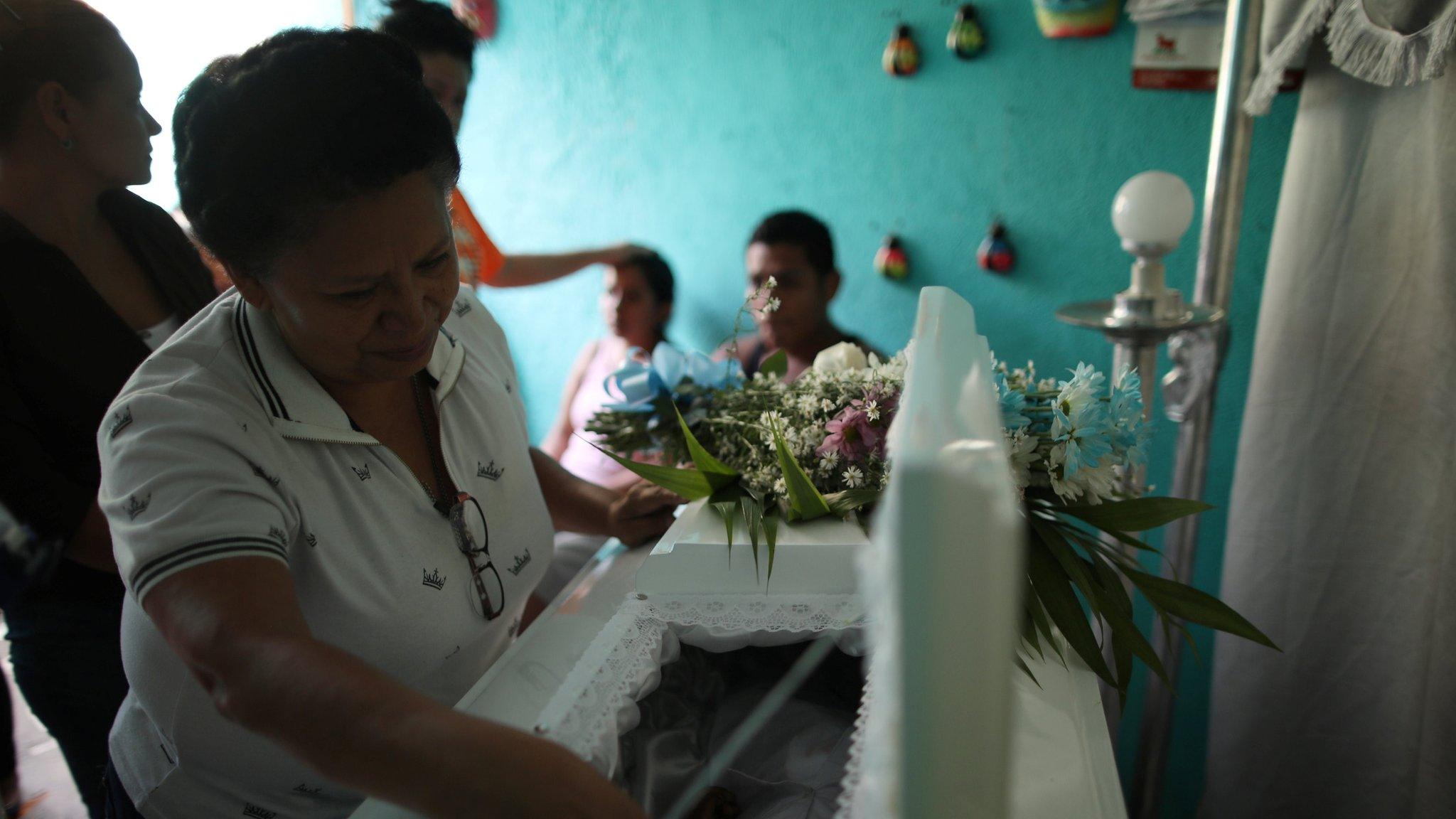
- Published19 June 2018
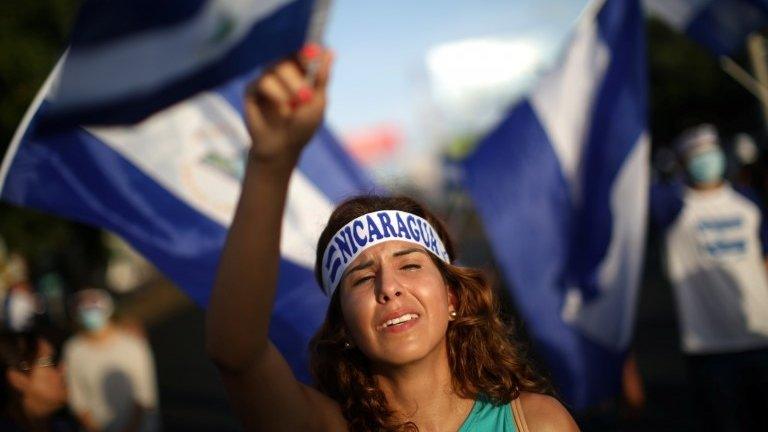
- Published29 May 2018
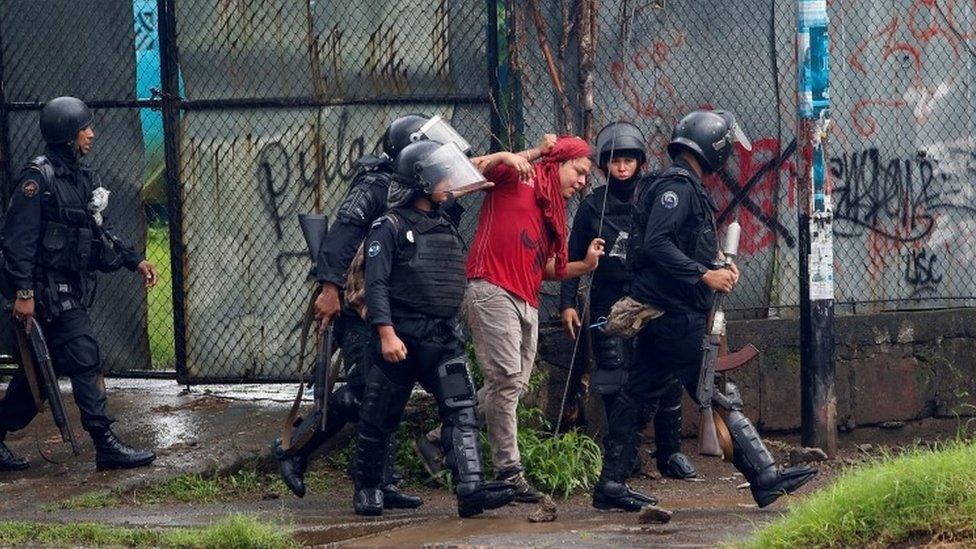
- Published18 July 2018
